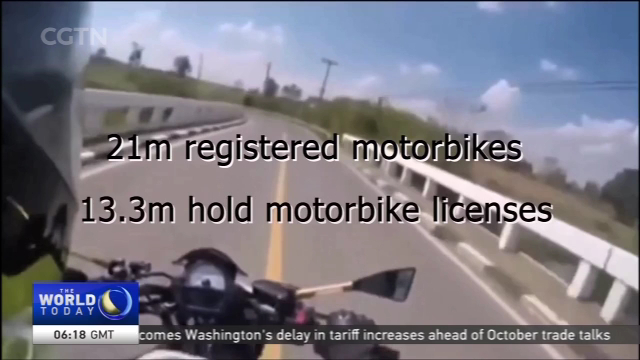
15:30, 13-Sep-2019
Thai Bikers Face Deadly Risk: 1 in 3 motorbike riders has no license
Updated
16:13, 13-Sep-2019

New figures have revealed 1 in 3 motorbike riders in Thailand has no license and that's in a country with the world's highest percentage of bike deaths. Most at risk are young people. Now instruction courses for high school students are being launched. CGTN's correspondent Martin Lowe reports.
High-speed, complacency, and a lack of law enforcement have all been blamed for Thailand's appalling motorbike carnage. But now there's another reason – figures have revealed one in three bike riders doesn't have a license.
Thailand has 21 million registered motorbikes, but only just over 13 million riders have passed a test and hold licenses. This, in a country with the highest percentage of bike deaths in the world. On average 68 people are killed on Thai roads every day – almost three-quarters of them bike riders.
DR. THANAPONG JINWONG SECRETARY GENERAL, THAI ROAD SAFETY POLICY FOUNDATION "I'm concerned that children are being killed under the age of 15 when they have no right to ride motorbikes. Half of the riders over 15 who have accidents don't have licenses. Most learn how to ride from family, friends or by themselves so they lack the knowledge to ride safely."
Now the Thai government is providing motorcycle instruction at high schools. It's launched a 900,000 US-dollar scheme to train young riders.
DR. THANAPONG JINWONG SECRETARY GENERAL, THAI ROAD SAFETY POLICY FOUNDATION "I think this is a good idea because it helps youngsters who don't have licenses to learn how to ride properly, but we need to focus on the quality of riding not just the number of people having licenses."
The target is to bring 51,000 high school students up to a standard where they can pass a test and obtain a license.
MARTIN LOWE BANGKOK "It's common here in Thailand to see children riding motorbikes to school well under the legal age to hold licenses. Also 3 or 4 youngsters on the same bike - rarely wearing helmets. It seems there's often a casual disregard for road safety."
Instructors hope teaching riding skills can help more young people obtain a proper license – but, more importantly, reduce the shocking toll of injury and death on the country's roads.
SITEMAP
Copyright © 2018 CGTN. Beijing ICP prepared NO.16065310-3
Copyright © 2018 CGTN. Beijing ICP prepared NO.16065310-3